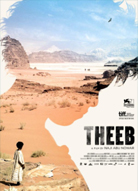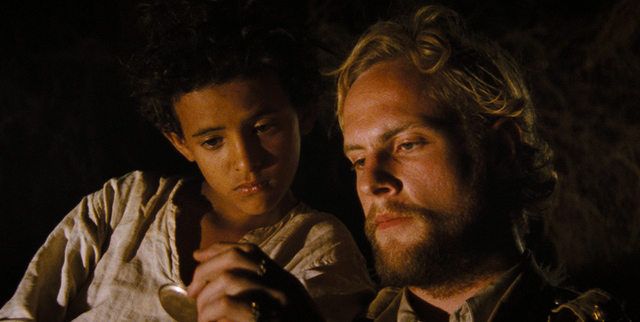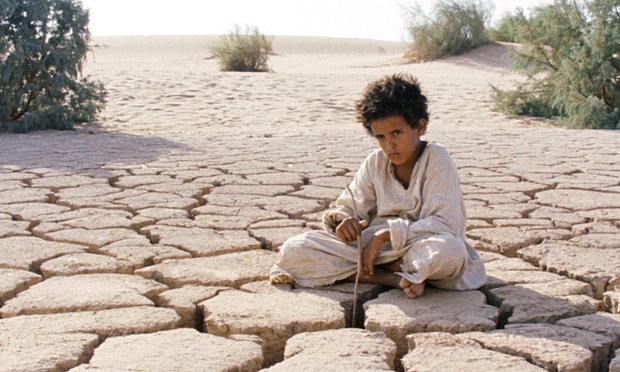Interview: 'Theeb' Director Naji Abu Nowar on Bedouin Culture and Being Selected as Jordan's Oscar Submission
 Friday, November 6, 2015 at 10:30AM
Friday, November 6, 2015 at 10:30AM  Jose here. Set in 1916 Theeb centers on the title character, a Bedouin boy, played by Jacid Eir Al-Hwietat, who’s lived his whole life in the desert. He is being trained as a guide by his older brother Hussein (Hussein Salameh) and the opportunity for him to try his new skills arrives when a British soldier (Jack Fox) and his companion (Marji Audeh) hire the siblings to show them across the desert. As they discover they are being tracked by enemies, Theeb is forced to fend for himself in the unknown. Combining elements of coming-of-age stories and adventure films, director Naji Abu Nowar is able to craft the rare film that entertains and enlightens. He subverts genre conventions in unexpected ways, for instance this time around it’s the nameless white man who treats others with contempt and shows little regard for their traditions.
Jose here. Set in 1916 Theeb centers on the title character, a Bedouin boy, played by Jacid Eir Al-Hwietat, who’s lived his whole life in the desert. He is being trained as a guide by his older brother Hussein (Hussein Salameh) and the opportunity for him to try his new skills arrives when a British soldier (Jack Fox) and his companion (Marji Audeh) hire the siblings to show them across the desert. As they discover they are being tracked by enemies, Theeb is forced to fend for himself in the unknown. Combining elements of coming-of-age stories and adventure films, director Naji Abu Nowar is able to craft the rare film that entertains and enlightens. He subverts genre conventions in unexpected ways, for instance this time around it’s the nameless white man who treats others with contempt and shows little regard for their traditions.
If anything Theeb is a necessary film, which might be why it was selected by Jordan to represent them at the Oscars. I sat down with director Nowar to talk about the autobiographical elements in the film, learning film distribution lingo, and how instinct is what matters the most when it comes to directing.
JOSE: Let’s get started with a business question. How is it to have your film being distributed in the States?
NAJI ABU NOWAR: It’s amazing! I lived in the desert making this film with the Bedouin, and the edit was done very close to them in case I had questions, so we really almost finished the entire film completely separated from the industry. We just assumed since we weren’t an English language film we would never play in America, so it’s been such an amazing ride to see the film do really well in Britain, and to now see it in America is unbelievable. We hope audiences respond.
JOSE: The film won awards at the 2014 Venice Film Festival, but I’m sure as a filmmaker your purpose is to do films that go beyond festivals? Especially because Theeb is essentially an adventure movie, not an art film. [more after the jump]
NOWAR: I’ve never had any experience with any film industry, I came up just sort of doing my thing because I love cinema, so I’d write scripts by myself and do things with people who loved cinema like I did. My first short got into a few film festivals, so going to that was fun, but I didn’t know anything. I didn’t know the terms “arthouse” or “independent”, I’m not partaking in any of those worlds, it’s all new to me, and after making the film, the next best thing has been this year of touring, and bringing your film all over the world.
One of the most frustrating things as a cinephile is that films not in English are instantly considered “art movies”, so we miss out on great genre films from all over the world.
Exactly, that’s the kind of thing I’ve started to learn, we’re “arthouse”.
Not that there’s no artistry in Theeb of course, but while I watched it I thought it was such an entertaining family film.
What we found is that in England for example, where it’s really tough to get a deal, we were booked for 5 cinemas or something and now we’re in 26 or 30, it got rebooked every week. That was wonderful and it proved the film has legs and it’s not a one off a select group of people go see, it’s a film people from all walks of life are enjoying. What can I say? It’s like Christmas every month. Now that Jordan submitted us for the Oscars, it’s a crazy thing. I’m just gonna keep riding it (laughs)

Speaking of Oscar, has the submission affected the way people talk to you about the film?
There are two stages with this film. We made it, we’re proud of it and we don’t know what’s going to happen in the world. We end up going to Venice and we had an amazing experience, with a ten minute standing ovation, it was such a beautiful moment. I was with the Bedouin who had left the country for the first time, and were attending their very first movie, they saw their film which was their first time seeing any film. You can’t top that. We’ve done a lot of commercial releases too, but I have to say when we got the American release and the Oscar submission, I also physically noticed a change in people’s perceptions. Strangers would come up to me to congratulate me, tell me they’re rooting for me. We’re in a really bad moment in the Middle East, so what’s touched me the most, is when strangers come up to me and say “we’re rooting for you, because you’re the one positive thing coming from our region, you’re putting us on the map for something that’s not negative”. To feel like your people feel positive because of your work is great. Nothing can beat that.
We know so little about Bedouin culture that I must ask if part of why you made Theeb was to help preserve their traditions for posterity?
It kind of became part of that after living with them for a year and seeing the poverty and social degradation, the loss of culture seen in the younger generations. Younger men have lost the knowledge and craftsmanship older men who lived as nomads had. People like Jacir for instance, who were born in the village, don’t have the information his father or grandfather has. I never made the film for this purpose, but something beautiful is what comes out of it. The Bedouin clothes for instance have been given a bad connotation in the world, with people thinking they’re Islamic fundamentalists’ clothes or terrorists. Actually there’s a whole world that has nothing to do with that, a world as old as time, but somehow the clothes have a negative connotation. Every now and then the producers will show me something cool, like a tweet of a guy who wrote “for some time I’ve been ashamed of my culture and never wore my clothes, but seeing the guys wearing the national clothes on the red carpet in Venice made me feel proud”. Because of all the negative imagery of the Arab world you start to see young people suffer from self-loathing of their culture and their image. It’s been cool to see young people embrace their culture, but that’s not why I made the film, I don’t make films for political reasons.
Naji Abu Nowar in New York City. Credit: Jose Solis
Theeb is at a point in his life where he can go either way, at the end of the movie in fact that’s what we get, he can either become one of those self-loathing people who have only been exposed to violence at the hands of invaders and intolerance, or he can pick the other road. Even though you mention the film isn’t political I guess it’s impossible as an artist not to let some of what’s going on in the world seep into your film…
You got me! (Laughs) You’re getting me into dangerous territory. But yes of course, it’s very relevant to today, Theeb could be Syrian right now.
You’ve said before that in Jordan you’re thought of as too British, and in the UK you’re considered as Middle Eastern…
Story of my life.
...so how much of yourself did you end up putting into Theeb?
There’s a lot of me in it, there was too much in him originally, my niece told me I was writing the character like Naji the nice little boy who went to school and is sensitive, not a boy from 1916 living in a harsh environment. I had to give him a thicker skin. There’s a lot of autobiographical stuff in the screenplay, I tend not to talk about it because when you make a film you don’t want to dictate to the audience what the meaning of the film is. I hate it when people tell me what their film is about, I watch it and I decide what the film is to me. But there are certain elements like losing siblings, I fell in a pool and almost drowned as a child...so things like that made it to the film.
It’s good that you’re not just saying this, but also do it in your film. You don’t digest the movie for your audience, and often keep us in the dark by avoiding obvious cross-cutting, which adds a very peculiar sense of threat to the whole film. People keep referring to Theeb as an adventure film or a Western, but I feel you’re borrowing genre elements to make something else altogether.
Two things, I’m a film lover and fan, and also a filmmaker, so that is one process and usually they cross paths. So when I get the idea for a film and feel the adrenaline rush, like making a Western out of Bedouin culture, that process ends and filmmaking takes over. So I watch my favorite films, let them wash over me, and I research and develop. So although things begin in a conceptual level, they become organic through filmmaking. As far as editing, it’s an instinctual thing, you let your gut dictate you how to do things, I really can’t intellectually explain it to you, because I don’t have the words for it...sometimes you get it hours later. Just because you made the film doesn’t mean you’re the best person to talk about it, in fact I might even be the worst.

Theeb is now playing in theaters.
 Naji Abu Nowar,
Naji Abu Nowar,  Oscars (15),
Oscars (15),  Theeb,
Theeb,  foreign films,
foreign films,  interview
interview 



Reader Comments (6)
love this bit about "arthouse" being a weird mandatory label if there are subtitles.
Wow great interview. Sorry to have missed it in the UK when I was there. Hopefully it'll come around out here. I'm a sucker for WWI and imperial histories so it's great to get a different story and even counter-narrative to Lawrence of Arabia, for example.
I saw Theeb at the 2015 Melbourne International Film Festival and was knocked out by the lead performance.
And there was a lot of 'Lawrence of Arabia' type images. Gorgeous cinematography.
I love any interview that feels more like a dialogue than a canned Q&A. So insightful and engaged, Jose!!
I saw the movie today and will not be surprised in the least if it's a top pick from the FL branch at large. It's a thoroughly enjoyable film.
I haven't been amazed by the Foreign Language submissions this year, but I'm ecstatic that so many have been released Stateside by this point. For those in New York at least, the picks from Canada, Sweden, India, Brazil, Austria, Germany, Taiwan, Greece, Spain, the Philippines, Jordan, and the Dominican Republic have all been released with several more-- France, Portugal, and Hungary that I know of-- coming before year's end and even more scheduled for early 2016. Hopefully, this is the start of a new trend.
Chris: Thanks! That's what I usually aim for, glad it reads as enjoyably as it was to conduct. I swear I could talk to some of these people forever.
catbaskets: Thanks! It's very Lawrence from another angle indeed. Highly recommended!